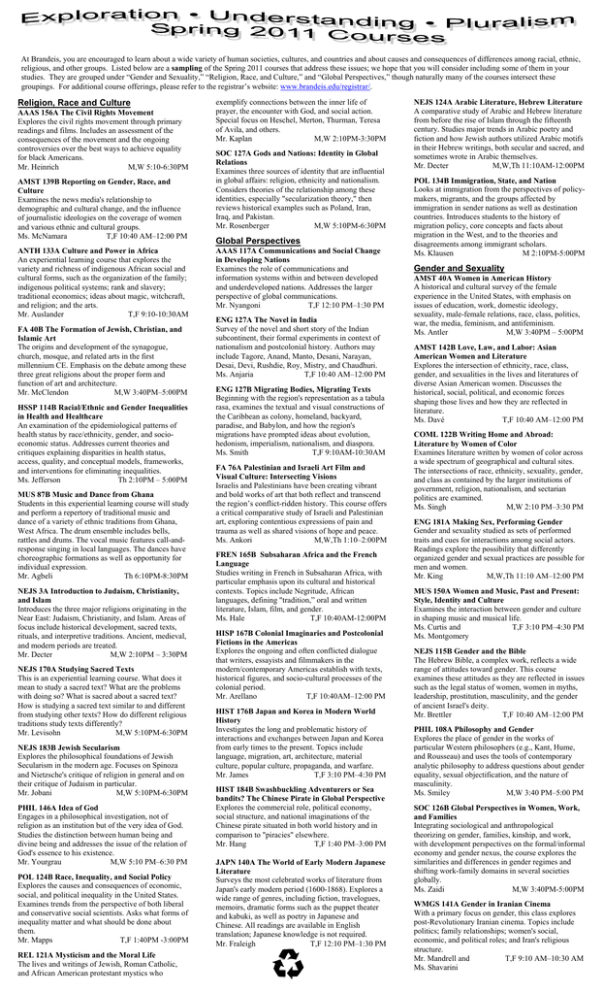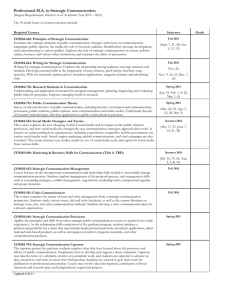At Brandeis, you are encouraged to learn about a wide...
advertisement

At Brandeis, you are encouraged to learn about a wide variety of human societies, cultures, and countries and about causes and consequences of differences among racial, ethnic, religious, and other groups. Listed below are a sampling of the Spring 2011 courses that address these issues; we hope that you will consider including some of them in your studies. They are grouped under “Gender and Sexuality,” “Religion, Race, and Culture,” and “Global Perspectives,” though naturally many of the courses intersect these groupings. For additional course offerings, please refer to the registrar’s website: www.brandeis.edu/registrar/. Religion, Race and Culture AAAS 156A The Civil Rights Movement Explores the civil rights movement through primary readings and films. Includes an assessment of the consequences of the movement and the ongoing controversies over the best ways to achieve equality for black Americans. Mr. Heinrich M,W 5:10-6:30PM AMST 139B Reporting on Gender, Race, and Culture Examines the news media's relationship to demographic and cultural change, and the influence of journalistic ideologies on the coverage of women and various ethnic and cultural groups. Ms. McNamara T,F 10:40 AM–12:00 PM ANTH 133A Culture and Power in Africa An experiential learning course that explores the variety and richness of indigenous African social and cultural forms, such as the organization of the family; indigenous political systems; rank and slavery; traditional economics; ideas about magic, witchcraft, and religion; and the arts. Mr. Auslander T,F 9:10-10:30AM FA 40B The Formation of Jewish, Christian, and Islamic Art The origins and development of the synagogue, church, mosque, and related arts in the first millennium CE. Emphasis on the debate among these three great religions about the proper form and function of art and architecture. Mr. McClendon M,W 3:40PM–5:00PM HSSP 114B Racial/Ethnic and Gender Inequalities in Health and Healthcare An examination of the epidemiological patterns of health status by race/ethnicity, gender, and socioeconomic status. Addresses current theories and critiques explaining disparities in health status, access, quality, and conceptual models, frameworks, and interventions for eliminating inequalities. Ms. Jefferson Th 2:10PM – 5:00PM MUS 87B Music and Dance from Ghana Students in this experiential learning course will study and perform a repertory of traditional music and dance of a variety of ethnic traditions from Ghana, West Africa. The drum ensemble includes bells, rattles and drums. The vocal music features call-andresponse singing in local languages. The dances have choreographic formations as well as opportunity for individual expression. Mr. Agbeli Th 6:10PM-8:30PM NEJS 3A Introduction to Judaism, Christianity, and Islam Introduces the three major religions originating in the Near East: Judaism, Christianity, and Islam. Areas of focus include historical development, sacred texts, rituals, and interpretive traditions. Ancient, medieval, and modern periods are treated. Mr. Decter M,W 2:10PM – 3:30PM NEJS 170A Studying Sacred Texts This is an experiential learning course. What does it mean to study a sacred text? What are the problems with doing so? What is sacred about a sacred text? How is studying a sacred text similar to and different from studying other texts? How do different religious traditions study texts differently? Mr. Levisohn M,W 5:10PM-6:30PM NEJS 183B Jewish Secularism Explores the philosophical foundations of Jewish Secularism in the modern age. Focuses on Spinoza and Nietzsche's critique of religion in general and on their critique of Judaism in particular. Mr. Jobani M,W 5:10PM-6:30PM PHIL 146A Idea of God Engages in a philosophical investigation, not of religion as an institution but of the very idea of God. Studies the distinction between human being and divine being and addresses the issue of the relation of God's essence to his existence. Mr. Yourgrau M,W 5:10 PM–6:30 PM POL 124B Race, Inequality, and Social Policy Explores the causes and consequences of economic, social, and political inequality in the United States. Examines trends from the perspective of both liberal and conservative social scientists. Asks what forms of inequality matter and what should be done about them. Mr. Mapps T,F 1:40PM -3:00PM REL 121A Mysticism and the Moral Life The lives and writings of Jewish, Roman Catholic, and African American protestant mystics who exemplify connections between the inner life of prayer, the encounter with God, and social action. Special focus on Heschel, Merton, Thurman, Teresa of Avila, and others. Mr. Kaplan M,W 2:10PM-3:30PM SOC 127A Gods and Nations: Identity in Global Relations Examines three sources of identity that are influential in global affairs: religion, ethnicity and nationalism. Considers theories of the relationship among these identities, especially "secularization theory," then reviews historical examples such as Poland, Iran, Iraq, and Pakistan. Mr. Rosenberger M,W 5:10PM-6:30PM Global Perspectives AAAS 117A Communications and Social Change in Developing Nations Examines the role of communications and information systems within and between developed and underdeveloped nations. Addresses the larger perspective of global communications. Mr. Nyangoni T,F 12:10 PM–1:30 PM ENG 127A The Novel in India Survey of the novel and short story of the Indian subcontinent, their formal experiments in context of nationalism and postcolonial history. Authors may include Tagore, Anand, Manto, Desani, Narayan, Desai, Devi, Rushdie, Roy, Mistry, and Chaudhuri. Ms. Anjaria T,F 10:40 AM–12:00 PM ENG 127B Migrating Bodies, Migrating Texts Beginning with the region's representation as a tabula rasa, examines the textual and visual constructions of the Caribbean as colony, homeland, backyard, paradise, and Babylon, and how the region's migrations have prompted ideas about evolution, hedonism, imperialism, nationalism, and diaspora. Ms. Smith T,F 9:10AM-10:30AM FA 76A Palestinian and Israeli Art Film and Visual Culture: Intersecting Visions Israelis and Palestinians have been creating vibrant and bold works of art that both reflect and transcend the region’s conflict-ridden history. This course offers a critical comparative study of Israeli and Palestinian art, exploring contentious expressions of pain and trauma as well as shared visions of hope and peace. Ms. Ankori M,W,Th 1:10–2:00PM FREN 165B Subsaharan Africa and the French Language Studies writing in French in Subsaharan Africa, with particular emphasis upon its cultural and historical contexts. Topics include Negritude, African languages, defining "tradition,” oral and written literature, Islam, film, and gender. Ms. Hale T,F 10:40AM-12:00PM HISP 167B Colonial Imaginaries and Postcolonial Fictions in the Americas Explores the ongoing and often conflicted dialogue that writers, essayists and filmmakers in the modern/contemporary Americas establish with texts, historical figures, and socio-cultural processes of the colonial period. Mr. Arellano T,F 10:40AM–12:00 PM HIST 176B Japan and Korea in Modern World History Investigates the long and problematic history of interactions and exchanges between Japan and Korea from early times to the present. Topics include language, migration, art, architecture, material culture, popular culture, propaganda, and warfare. Mr. James T,F 3:10 PM–4:30 PM HIST 184B Swashbuckling Adventurers or Sea bandits? The Chinese Pirate in Global Perspective Explores the commercial role, political economy, social structure, and national imaginations of the Chinese pirate situated in both world history and in comparison to "piracies" elsewhere. Mr. Hang T,F 1:40 PM–3:00 PM JAPN 140A The World of Early Modern Japanese Literature Surveys the most celebrated works of literature from Japan's early modern period (1600-1868). Explores a wide range of genres, including fiction, travelogues, memoirs, dramatic forms such as the puppet theater and kabuki, as well as poetry in Japanese and Chinese. All readings are available in English translation; Japanese knowledge is not required. Mr. Fraleigh T,F 12:10 PM–1:30 PM NEJS 124A Arabic Literature, Hebrew Literature A comparative study of Arabic and Hebrew literature from before the rise of Islam through the fifteenth century. Studies major trends in Arabic poetry and fiction and how Jewish authors utilized Arabic motifs in their Hebrew writings, both secular and sacred, and sometimes wrote in Arabic themselves. Mr. Decter M,W,Th 11:10AM-12:00PM POL 134B Immigration, State, and Nation Looks at immigration from the perspectives of policymakers, migrants, and the groups affected by immigration in sender nations as well as destination countries. Introduces students to the history of migration policy, core concepts and facts about migration in the West, and to the theories and disagreements among immigrant scholars. Ms. Klausen M 2:10PM-5:00PM Gender and Sexuality AMST 40A Women in American History A historical and cultural survey of the female experience in the United States, with emphasis on issues of education, work, domestic ideology, sexuality, male-female relations, race, class, politics, war, the media, feminism, and antifeminism. Ms. Antler M,W 3:40PM – 5:00PM AMST 142B Love, Law, and Labor: Asian American Women and Literature Explores the intersection of ethnicity, race, class, gender, and sexualities in the lives and literatures of diverse Asian American women. Discusses the historical, social, political, and economic forces shaping those lives and how they are reflected in literature. Ms. Davé T,F 10:40 AM–12:00 PM COML 122B Writing Home and Abroad: Literature by Women of Color Examines literature written by women of color across a wide spectrum of geographical and cultural sites. The intersections of race, ethnicity, sexuality, gender, and class as contained by the larger institutions of government, religion, nationalism, and sectarian politics are examined. Ms. Singh M,W 2:10 PM–3:30 PM ENG 181A Making Sex, Performing Gender Gender and sexuality studied as sets of performed traits and cues for interactions among social actors. Readings explore the possibility that differently organized gender and sexual practices are possible for men and women. Mr. King M,W,Th 11:10 AM–12:00 PM MUS 150A Women and Music, Past and Present: Style, Identity and Culture Examines the interaction between gender and culture in shaping music and musical life. Ms. Curtis and T,F 3:10 PM–4:30 PM Ms. Montgomery NEJS 115B Gender and the Bible The Hebrew Bible, a complex work, reflects a wide range of attitudes toward gender. This course examines these attitudes as they are reflected in issues such as the legal status of women, women in myths, leadership, prostitution, masculinity, and the gender of ancient Israel's deity. Mr. Brettler T,F 10:40 AM–12:00 PM PHIL 108A Philosophy and Gender Explores the place of gender in the works of particular Western philosophers (e.g., Kant, Hume, and Rousseau) and uses the tools of contemporary analytic philosophy to address questions about gender equality, sexual objectification, and the nature of masculinity. Ms. Smiley M,W 3:40 PM–5:00 PM SOC 126B Global Perspectives in Women, Work, and Families Integrating sociological and anthropological theorizing on gender, families, kinship, and work, with development perspectives on the formal/informal economy and gender nexus, the course explores the similarities and differences in gender regimes and shifting work-family domains in several societies globally. Ms. Zaidi M,W 3:40PM-5:00PM WMGS 141A Gender in Iranian Cinema With a primary focus on gender, this class explores post-Revolutionary Iranian cinema. Topics include politics; family relationships; women's social, economic, and political roles; and Iran's religious structure. Mr. Mandrell and T,F 9:10 AM–10:30 AM Ms. Shavarini

